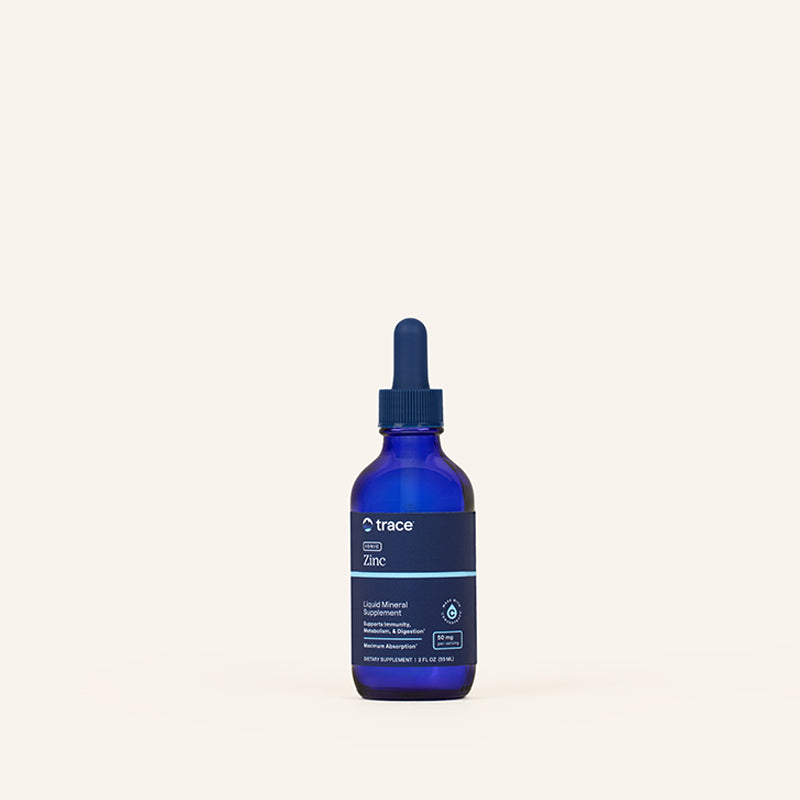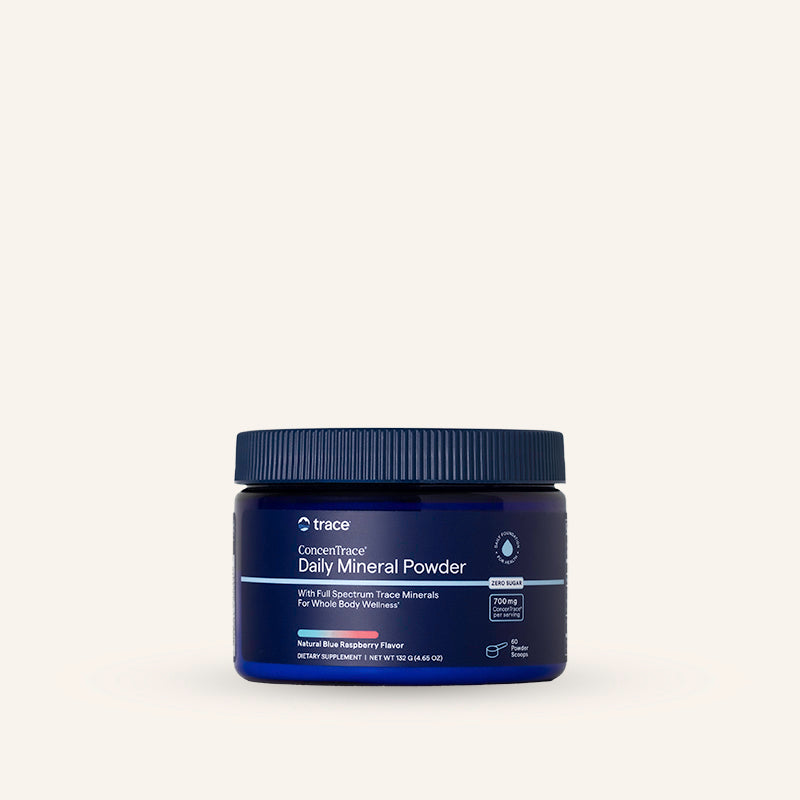Mood Boosting Supplements
At Trace, we know wellness isn't just physical—it’s emotional too. Our formulas go deeper, using bioavailable minerals and clean ingredients that support your daily feelings. No gimmicks, no fluff—just science-backed supplementation that delivers clarity, calm, and real, measurable results. With 50+ years of mineral expertise, we set the standard for what whole-body support really means.
Filters
Filters
Common Mineral Deficiencies That Affect Mood
When investigating the underlying causes of mood imbalances, research consistently spotlights the role of essential minerals. Clinicians and scientists increasingly recognize deficiencies in key minerals as significant contributors to mood, energy, and emotional well-being changes. Modern agricultural practices, food processing, and restricted dietary patterns have made certain mineral deficiencies more widespread, directly influencing neurological and psychological health. Below, the most commonly implicated minerals are explored, focusing on their scientifically established mood-related functions.
Magnesium
Magnesium is fundamental for over 300 biochemical processes in the body, including neurotransmitter synthesis and nervous system regulation. Numerous studies link low magnesium levels with increased feelings of anxiety, irritability, and occasional low mood. Inadequate magnesium intake may disrupt the pathways that regulate cortisol and serotonin, two crucial components for managing stress response and emotional stability.
Zinc
Zinc is critical in modulating the central nervous system and synaptic neurotransmission. Zinc deficiency has been associated with symptoms such as lack of motivation, cognitive fog, and even depressive states. Clinical trials have demonstrated that individuals with low zinc often report more frequent mood disturbances, underscoring the mineral’s importance for optimal cognitive function and mood regulation.
Iron
Iron is essential for oxygen transport and energy production at the cellular level and for synthesizing dopamine, a neurotransmitter linked to feelings of pleasure and motivation. Deficiency is especially common in women and endurance athletes, manifesting as fatigue, low mood, and decreased concentration. Iron deficiency may lower serotonin production, amplifying the risk of emotional imbalances.
Potassium
Potassium is necessary for maintaining proper nerve function and signaling. Recent research suggests that insufficient potassium levels may contribute to fatigue, muscle weakness, and irritability, indirectly impacting mood and overall well-being. Potassium’s interaction with sodium also helps prevent the overstimulation of nerve cells, contributing to a calmer mental state.
Calcium
Though celebrated for its role in bone integrity, calcium also participates in neurotransmitter release and nerve signaling. Studies have shown that calcium deficiency can result in heightened nervousness, muscle tension, and restlessness. Hormonal fluctuations, such as those during PMS, often exacerbate calcium needs, making select populations more vulnerable to mood swings related to calcium insufficiency.
Selenium
Selenium is a powerful antioxidant and one of the natural mood boosters, protecting nerve cells from oxidative damage. Low selenium status has been correlated with more frequent reports of anxiety, irritability, and low mood, particularly in populations with diets typically deficient in this trace mineral.

Incorporating Mineral Supplements Into Your Daily Routine
Essential minerals such as magnesium, calcium, and potassium play foundational roles in neurotransmitter synthesis, nerve function, and healthy stress response—critical components for a balanced mood, as supported by research in clinical nutrition journals.
- Assess Your Current Intake: Start by evaluating your diet and lifestyle. Diets high in processed foods often lack essential trace minerals like magnesium, calcium, and potassium, crucial for supporting mood and nervous system function.
- Choose Consistency Over Complexity: Consistency is more important than timing perfection. Take your mineral supplements at the same time daily, such as with breakfast or after exercise, to build a reliable habit and enhance absorption.
- Pair With Food For Better Absorption: Some minerals, like magnesium, are absorbed more effectively when consumed with food. Incorporating supplements into meals helps reduce stomach discomfort and improves nutrient uptake.
- Track Your Mood & Energy: Keep a simple journal of your mood, energy levels, and mental clarity to notice trends or improvements linked to your supplement routine. This self-awareness can guide long-term adjustments.
- Consult With Health Professionals: To tailor your supplementation plan, work with a healthcare provider or registered dietitian. They can help assess your unique needs and guide dosage and formulation.
- Support with Lifestyle Habits: Supplements are most effective when part of a larger wellness routine. Combine them with nutrient-dense meals, proper hydration, regular movement, and high-quality sleep for holistic mood support.
- Monitor For Subtle Shifts: Changes may be gradual. Pay attention to reduced irritability, improved focus, or better stress resilience as potential signs that your supplement routine is working.
- Prioritize Bioavailable Forms: Select supplements with highly bioavailable ingredients to ensure your body can absorb and utilize them efficiently, helping you benefit from every dose.
Recognizing Signs Of Mineral Deficiency
Identifying mineral deficiencies is a critical step in supporting overall mood and well-being. Minerals such as magnesium, potassium, calcium, and zinc play fundamental roles in neurological function, neurotransmitter synthesis, and the body’s stress response. When dietary intake falls short, subtle—and sometimes pronounced—symptoms can emerge.
- Mood & Emotional Shifts: Low magnesium, zinc, and calcium levels are often associated with irritability, mood swings, and increased sensitivity to stress. These emotional fluctuations may be an early warning sign of a mineral imbalance.
- Cognitive Fog & Difficulty Focusing: Inadequate potassium or magnesium intake can affect concentration and memory. You might notice episodes of brain fog or difficulty staying mentally sharp throughout the day.
- Unexplained Fatigue: Persistent tiredness that doesn’t improve with rest could point to low magnesium or iron levels. These minerals are crucial for cellular energy production and nervous system efficiency.
- Muscle Cramps & Twitches: Frequent cramps, spasms, or muscle tightness may indicate a deficiency in electrolytes like calcium, magnesium, or potassium—all essential for muscle and nerve function.
- Sleep Disruptions: Disrupted sleep patterns, including trouble falling or staying asleep, are commonly linked to low magnesium. This mineral regulates melatonin and calms the nervous system.
- Heightened Anxiety Or Restlessness: Magnesium and zinc are critical for regulating GABA, a calming neurotransmitter. Low levels can contribute to ongoing anxiety, restlessness, and difficulty relaxing.
- Slower Stress Recovery: If you feel overwhelmed by minor stressors or take longer to bounce back, you may lack stress-buffering minerals like magnesium and calcium, which help regulate the body's stress response.
- Diminished Physical Resilience: When your muscles feel weak or recovery is unusually slow after exertion, consider whether you're getting enough minerals. Deficiencies can impair both physical endurance and emotional stamina.
Feel more like yourself again—starting from the inside out. At Trace Minerals, our mood boosting supplements are crafted with clean, bioavailable minerals that support emotional balance, stress resilience, and clarity. No shortcuts, just real ingredients that help you feel steady, clear, and in control. Support your mood with the nutrients it actually needs—because every day deserves your best mindset.
Lifestyle Tips For Boosting Your Mood Naturally
Regarding supporting a healthy mood, lifestyle choices can be as impactful as the supplements you choose.
Consider these practical, research-backed habits that have been shown to foster emotional well-being:
- Prioritize Regular Physical Activity: Engaging in exercise—whether a brisk walk, a gym session, or a favorite sport—stimulates endorphin release, those natural chemicals that help you feel happier and less stressed. Studies have consistently found a direct link between physical activity and reduced symptoms of anxiety and depression.
- Nourish With Whole Foods: A balanced diet of fruits, vegetables, whole grains, lean proteins, and healthy fats provides essential nutrients your brain craves. These include B vitamins, omega-3 fatty acids, and a spectrum of minerals that play key roles in neurotransmitter production and neural function. Limiting processed foods and added sugars can further support mood stability.
- Establish Consistent Sleep Patterns: Quality sleep is paramount for mental health. Aim for 7–9 hours each night while maintaining consistent sleep and wake times—even on weekends. Insufficient or irregular sleep can disrupt hormone regulation and neurotransmitter balance, increasing vulnerability to low mood.
- Cultivate Social Connections: Human interaction is a well-established buffer against stress. Prioritize time with friends and loved ones, join group activities, or even connect virtually when in-person meetings aren’t possible. Social support and meaningful conversation can significantly boost your outlook and resilience.
- Practice Mindfulness & Stress Management. Simple mindfulness techniques—like breathing exercises, meditation, or journaling—help regulate stress hormones and anchor your mind in the present. Chronic stress contributes to mood disturbances; reducing it empowers your body and brain to function optimally.
Our Expert-Formulated Mineral Solutions For Mood Enhancement
Our ConcenTrace® Daily Mineral Powder is expertly crafted to support emotional well-being at the cellular level. Our mood enhancing supplements are formulated with essential trace minerals that your body recognises and uses efficiently. They help rebalance the internal systems that regulate stress response, neurotransmitter activity, and daily mood stability.
Supports Nervous System Balance And Stress Response
Magnesium is central to emotional regulation. It helps manage the body’s response to stress by calming overactive nerve signals and supporting the production of mood-stabilising neurotransmitters like serotonin. Our ConcenTrace® formula delivers this essential mineral in a bioavailable form, helping you feel more grounded and resilient.
Improves Electrical Signaling And Emotional Clarity
Your brain relies on balanced electrolytes to send clear, steady messages to the rest of your body. Potassium and sodium work together to regulate nerve impulses and fluid exchange, which are critical for maintaining mental clarity, emotional stability, and calm during demanding days.
Enhances Hydration For Cognitive And Mood Support
Chloride may be overlooked, but it plays an essential role in fluid regulation and pH balance. Keeping hydration levels consistent supports optimal brain function, which can directly impact how you feel. Better hydration means better nutrient delivery, less fatigue, and more mental sharpness.
Delivers Natural Antioxidant And Nutrient Protection
Spirulina adds a potent nutritional edge. This superfood is rich in vitamins, minerals, and antioxidants that help protect your brain from oxidative stress, a factor often linked to low mood and mental burnout. Its amino acids also contribute to dopamine production, which is crucial for motivation and emotional well-being.
Read also:
Frequently Asked Questions
Mood-boosting supplements are specifically formulated products—often containing vitamins, minerals, amino acids, and botanicals—that aim to support a balanced mood, promote relaxation, or help the body manage occasional stress. At Trace, our formulations emphasize replenishing essential minerals such as magnesium and potassium, which research shows are closely linked to mood regulation and nervous system health.
Mood-boosting supplements supply the nutrients and minerals required for optimal neurotransmitter function, hormone balance, and nervous system support. For instance, magnesium is crucial in producing serotonin, a key neurotransmitter in mood regulation. By addressing underlying nutritional deficiencies, these supplements can help promote emotional well-being and resilience to occasional stress.
Safety is our top priority—reputable brands like Trace Minerals craft mood-boosting supplements that follow industry best practices and rigorous quality standards. While most supplements are well-tolerated when used as directed, we recommend consulting a healthcare professional before adding any new supplement to your routine, especially if you are pregnant, breastfeeding, have underlying health conditions, or are taking prescription medications.
Mood boosting supplements are not intended to replace prescription medications for mood disorders such as depression or anxiety. They can, however, be part of a holistic approach to wellness and may complement other lifestyle strategies. Always speak with a healthcare provider before altering your medication regimen or integrating supplements with prescribed treatments.
The timeframe for experiencing benefits from mood boosting supplements can vary. Some individuals may notice changes within a few days, especially if they are correcting a specific deficiency, while for others, noticeable effects might take several weeks. Consistency is key; the best results come from integrating supplementation into a balanced diet and healthy lifestyle.
Most people tolerate mood boosting supplements well, mainly when sticking to recommended dosages. However, some individuals may experience mild digestive symptoms or interact with certain medications. Reading labels carefully and consulting a healthcare professional can help minimize risk and ensure supplements suit your needs.



